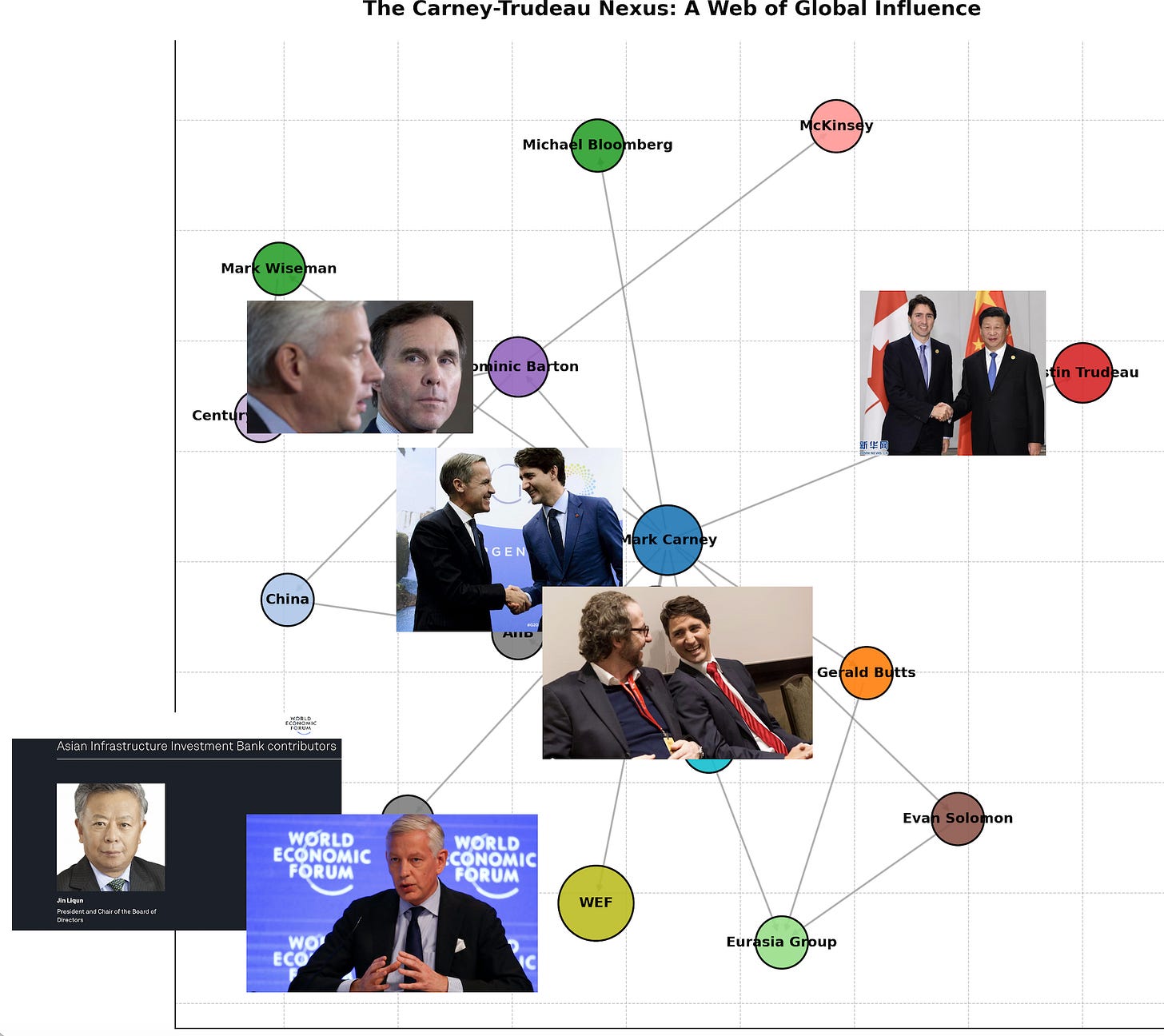The Carney-Trudeau Nexus: How Financial Elites from Davos to Beijing Are Shaping Canada’s Next Federal Election
OTTAWA — As Canada braces for a leadership change—with Prime Minister Justin Trudeau poised to step down, Mark Carney emerging as his successor, and speculation mounting over a snap election as early as March—the defining question of Carney’s campaign is whether he will govern differently from the deeply unpopular Trudeau. Carney’s camp insists he will, particularly on carbon reduction and immigration—issues that polls suggest have alienated a majority of Canadians.
Yet a closer examination of Carney’s elite network—guided by the principle that long-standing relationships of trust and shared financial interests will shape governance—reveals a constellation of global influencers deeply tied to the World Economic Forum and China’s trade and finance arms, particularly the Asian Infrastructure Investment Bank (AIIB). At its core, this network of remarkable figures—whose stated goals center on consolidating financial power across borders to coordinate carbon-reduction policies and progressive social outcomes—includes not just Carney and Trudeau but also former Canadian ambassador to China Dominic Barton, Trudeau campaign backers Mark Wiseman and Gerald Butts, and AIIB’s Jin Liqun, reportedly a senior Chinese Communist Party operative.
Carney’s influence also appears to extend into Canada’s state broadcaster. Former Power & Politics host Evan Solomon—who now works in a consultancy with Carney’s wife and Gerald Butts—in 2015 was embroiled in an art-dealing scandal involving Carney, whom he referred to as “the Guv.” In a leaked email, Solomon reportedly wrote: “Next year in terms of the Guv will be very interesting. He has access to the highest power network in the world.”
For Canadian voters, understanding the intricate plutocratic web surrounding Trudeau and Carney is not an academic exercise—it offers a glimpse into the forces lining up to shape the nation’s climate, trade, and social policies. While the World Economic Forum has become a lightning rod for both criticism and political polarization—opponents accuse it of fostering undemocratic policymaking, while defenders dismiss such concerns as conspiracy theories—an objective, network-based analysis of its ties to Beijing’s financial arms and the key figures in Carney’s orbit suggests a well-defined pattern of shared interests. These interests are likely to drive Canadian governance under Carney—unless he makes the illogical decision to sever ties with the power networks and public-private partnerships that have defined his ascent.
How does this relate to Canada’s pending election? Across the West, concerns over immigration, housing affordability, and energy policy are shaping voter priorities like never before. Carney’s allies argue that the urgency of the climate crisis demands coordinated, high-level solutions—ones driven by big private capital and partnerships with Chinese institutions like the AIIB. Skeptics, however, see a “Davos” elite imposing sweeping policies on carbon, trade, and immigration with little democratic input.
These issues are open to debate. What is not, however, is the deep entanglement of Carney and Trudeau’s networks—so thoroughly woven together through global forums like the WEF that they are indistinguishable. And while Carney seeks to distance himself from Trudeau’s unpopular record, his closest allies remain the same WEF-linked figures who helped shape Trudeau’s policies.
Global Banker and Chinese Finance Maximalist
A former Goldman Sachs banker, Mark Carney rose to global prominence in 2008 as Governor of the Bank of Canada, credited with stabilizing the country’s banking system amid a worldwide financial meltdown. In 2013, he became the first Canadian to lead the Bank of England—an unprecedented appointment. During his tenure, Carney integrated climate risk into financial stability assessments, positioning himself as a leader in climate-focused central banking.
He also materially deepened the UK’s financial ties with China.




